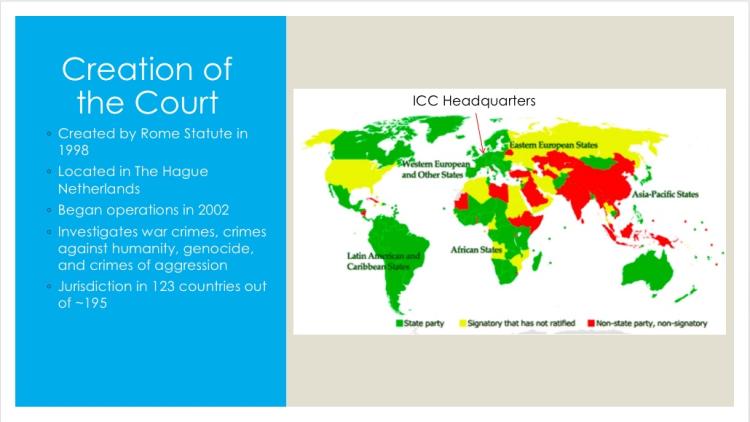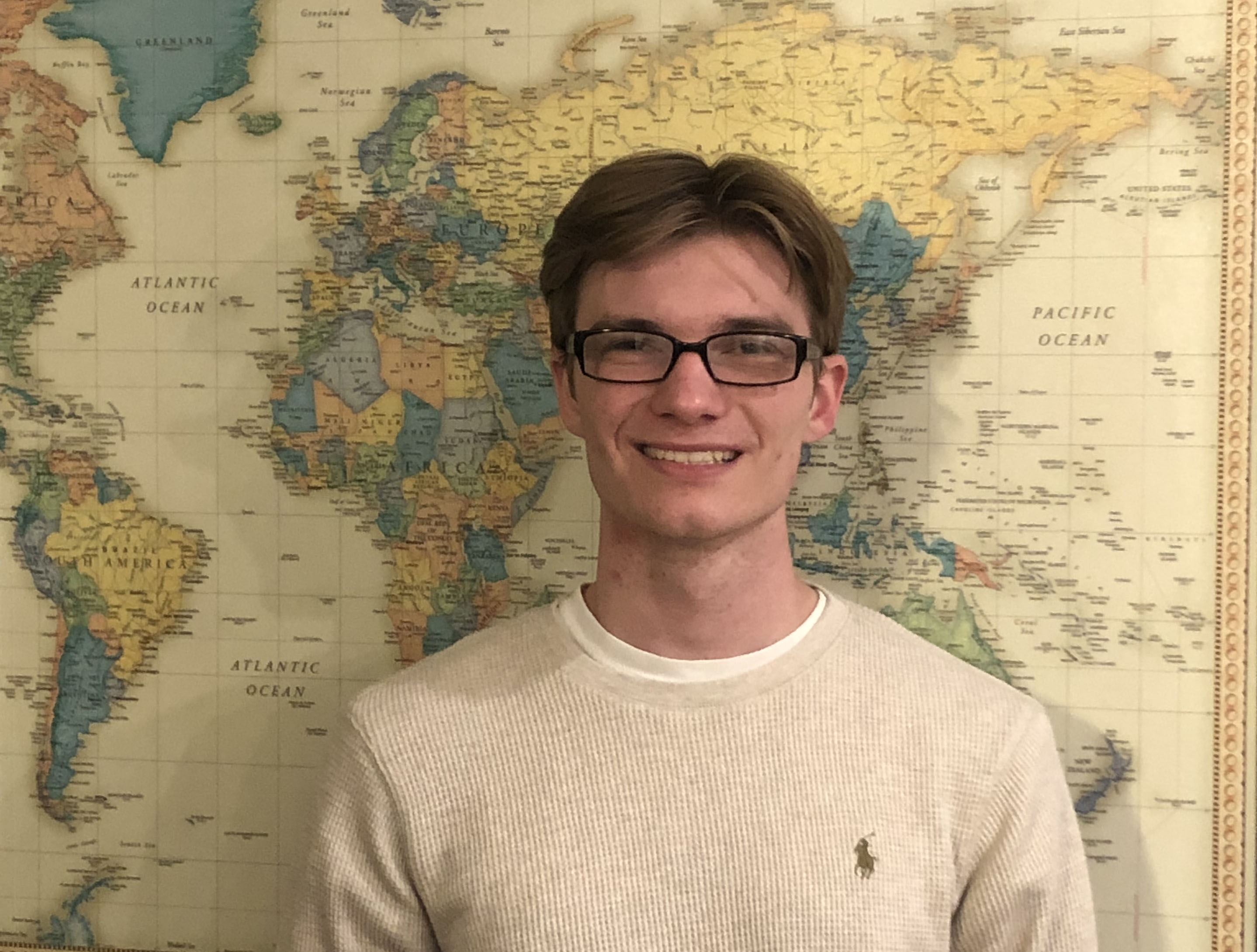

Adam Lappe, a senior majoring in political science and international studies, was selected as the only student represented from Missouri at the Posters on the Hill showcase, an event that includes an audience of government leaders in Washington D.C., particularly members of the United States Congress and their staff.
Lappe’s virtual slide-show presentation, titled “Triggers Jurisdiction and the International Criminal Court (ICC),” explores his interest in the permanent international court, based out of Europe, which began operations in 2002 to investigate, prosecute, and try individuals who commit the most serious international crimes: those against humanity, or genocide, aggression, and war.
“The court is tasked with investigating and bringing to justice the perpetrators, not the everyday soldier,” says Lappe. “So, it’s the leaders of these armies, the politicians behind war crimes.”
There are three triggers of jurisdiction (the starting point for an ICC case), according to Lappe:
- State Trigger - When a member state of the ICC officially asks for the court to investigate crimes committed against it or in its territory. (Ukraine just did this with Russia. More below.)
- United Nations Security Council (UNSC) Trigger - When the council believes one if those four crimes is being committed somewhere in the world and officials refers the situation to the court for investigation. (For example, the genocide in Darfur in Africa.)
- The ICC Trigger - When the prosecutors in the court believe crimes are being committed in a member state and the government in that state are either unable or unwilling to open investigations and bring people to justice. (This happened in the Philippines when the president supported killing its citizens to reduce drug crimes. More below.)
“Basically, my project discusses which of these triggers ends up leading to the most warrants of arrest issued by the court and the most arrests made,” Lappe explains.
The Roots of Interest
Lappe credits his interest in political science and international studies from growing up in Iowa, the middle of the country, where he questioned but did not have much rhetoric about international experiences.
“I was really curious about the rest of the world,” says Lappe, who was recently accepted into the PhD program in political science at the University of Iowa. “I wanted to know about different religions, political views, languages, international studies …. Political science combined all that for me.”
Lappe, whose goal is to be a professor teaching international relations, was surprised to learn he was selected for this prestigious national event. “I thought, I should probably prepare well for this because it is a big deal,” he says. “I’m a little intimidated, but also very excited.”
A lot of people don’t know what it is, and honestly there is very little research on it, and I wanted to go and shed some light on that. This court is for the worst of the worst. - Adam Lappe
He began his project during his junior year while working with the McNair Scholars Program, which funded $3,000 toward his research as part of a federally funded congressional program that broadly supports underrepresented individuals. Lappe qualified as a first-generation college student. His mentor, Bryce Reeder, a political science professor at Mizzou, assisted in many ways, including showing him how to do statistical coding on Zoom, how to write a literature review, create a political science paper, and so much more. His first project on this topic was completed for the Scholars Program.
“I really just wanted to study this international court. I saw a couple articles about it, and I was wondering what this international criminal court was. We have our own courts, but I was asking, ‘What is this?’ ‘Is it just in Europe?’ And I did some digging and I found out it really was a worldwide court. A lot of people don’t know what it is, and honestly there is very little research on it, and I wanted to go and shed some light on that. This court is for the worst of the worst.”
The Reach of ICC
Although its reach is worldwide, ICC doesn’t have jurisdiction over every country, Lappe explains. For example, the U.S., China, and Russia, do not fall under its jurisdiction, though most of Europe, Canada, Latin America, Australia, and others do.
“The countries who want nothing to do with it, are like full stop ‘we don’t want this thing to exist.’ And then there are countries who are like ‘Hey, this is a cool thing, and we will support its existence, but we don’t want to be a part of it because a bunch of judges that aren’t even in our country could investigate us for doing things.’”
The U.S. was asked to join the international court under President Clinton. A delegate was sent to the United Nations’ main building in New York City to sign the paperwork, but upon getting off the subway and walking into the building to do so, things changed. “He was about to sign this large international agreement, but he got a call and answered it and it was President Bill Clinton who said, ‘I changed my mind. Do not sign the document.’ So, the United States was just minutes away from signing the document and becoming a part of it. Instead, they just signaled their support of it,” Lappe explains.
Lappe speculates Clinton didn’t sign because in doing so, the U.S. would lose some of its sovereignty. “So, if you know you’re the president, and you’re doing some shady stuff like selling guns to other countries or ordering your soldiers to do such in a different country like what we did in Afghanistan … yeah, you could be investigated and tried in an international court for that.”
The court has had successes: They were involved in investigations when African countries oppressed elections, as well as the genocide in Southeast Asia. And are now involved with the Russian invasion of Ukraine.
“What interests me is that Russia is really not a part of the international courts. So technically, nothing Russia does can really get investigated unless Russia really wants it. But they would never do that,” says Lappe.
“But Ukraine is in the International Criminal Court, and they were like, ‘hey we’re getting attacked. Can you come investigate this? And even though Russia’s not a member, they might be investigated because they did things that impacted a member state. So, the court looks for loopholes to be able to investigate these crimes.”
ICC has also had its challenges: For example, when Philippines’ President Rodrigo Duterte encouraged police officers to kill anyone in the drug trade to cleanse the country of crime and corruption, the International Criminal Court opened an investigation because of crimes against humanity, the killing of his own citizens, says Lappe. But the ICC is not doing well with that case, because Duterte refused to cooperate, therefore little, so far, has come out of the investigation, Lappe adds.
Lappe will present his findings at Posters on the Hill, April 26–27. This is the third year a Mizzou student has been selected for the national event, usually held on Capitol Hill in Washington D.C. Any qualifying student from any course of study can participate, if selected to represent their state. The maximum number of students presenting will be 50, representing all U.S. states.